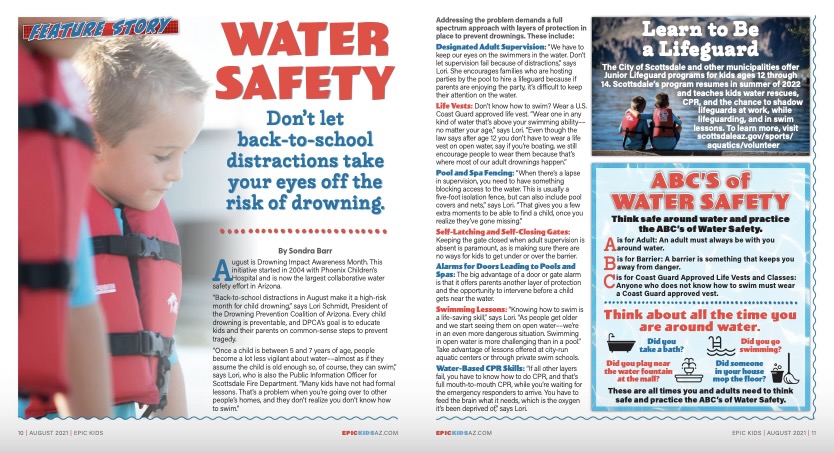Water Safety
Don’t let back-to-school distractions take your eyes off the risk of drowning.
By Sondra Barr
August is Drowning Impact Awareness Month. This initiative started in 2004 with Phoenix Children’s Hospital and is now the largest collaborative water safety effort in Arizona.
“Back-to-school distractions in August make it a high-risk month for child drowning,” says Lori Schmidt, President of the Drowning Prevention Coalition of Arizona. Every child drowning is preventable, and DPCA’s goal is to educate kids and their parents on common-sense steps to prevent tragedy.
“Once a child is between 5 and 7 years of age, people become a lot less vigilant about water––almost as if they assume the child is old enough so, of course, they can swim,” says Lori, who is also the Public Information Officer for Scottsdale Fire Department. “Many kids have not had formal lessons. That’s a problem when you’re going over to other people’s homes, and they don’t realize you don’t know how to swim.”
Addressing the problem demands a full spectrum approach with layers of protection in place to prevent drownings. These include:
Designated Adult Supervision: “We have to keep our eyes on the swimmers in the water. Don’t let supervision fail because of distractions,” says Lori. She encourages families who are hosting parties by the pool to hire a lifeguard because if parents are enjoying the party, it’s difficult to keep their attention on the water.
Life Vests: Don’t know how to swim? Wear a U.S. Coast Guard approved life vest. “Wear one in any kind of water that’s above your swimming ability––no matter your age,” says Lori. “Even though the law says after age 12 you don’t have to wear a life vest on open water, say if you’re boating, we still encourage people to wear them because that’s where most of our adult drownings happen.”
Pool and Spa Fencing: “When there’s a lapse in supervision, you need to have something blocking access to the water. This is usually a five-foot isolation fence, but can also include pool covers and nets,” says Lori. “That gives you a few extra moments to be able to find a child, once you realize they’ve gone missing.”
Self-Latching and Self-Closing Gates: Keeping the gate closed when adult supervision is absent is paramount, as is making sure there are no ways for kids to get under or over the barrier.
Alarms for Doors Leading to Pools and Spas: The big advantage of a door or gate alarm is that it offers parents another layer of protection and the opportunity to intervene before a child gets near the water.
Swimming Lessons: “Knowing how to swim is a life-saving skill,” says Lori. “As people get older and we start seeing them on open water––we’re in an even more dangerous situation. Swimming in open water is more challenging than in a pool.” Take advantage of lessons offered at city-run aquatic centers or through private swim schools.
Water-Based CPR Skills: “If all other layers fail, you have to know how to do CPR, and that’s full mouth-to-mouth CPR, while you’re waiting for the emergency responders to arrive. You have to feed the brain what it needs, which is the oxygen it’s been deprived of,” says Lori.
Learn to Be a Lifeguard
The City of Scottsdale and other municipalities offer Junior Lifeguard program for kids ages 12 through 14. Scottsdale’s program resumes in summer of 2022 and teaches kids water rescues, CPR, and the chance to shadow lifeguards at work, while lifeguarding, and in swim lessons. To learn more, visit scottsdaleaz.gov/sports/aquatics/volunteer
ABC’s of WATER SAFETY
Think safe around water and practice the ABC’s of Water Safety.
A is for Adult: An adult must always be with you around water.
B is for Barrier: A barrier is something that keeps you away from danger.
C is for Coast Guard Approved Life Vests and Classes: Anyone who does not know how to swim must wear a Coast Guard approved vest.
Think about all the time you are around water. (to tie in with the above)
Did you take a bath?
Did you play near the water fountain at the mall?
Did you go swimming?
Did someone in your house mop the floor?
These are all times you and adults need to think safe and practice the ABC’s of Water Safety
To view the story in our latest issue, visit https://issuu.com/egpublishing/docs/epickids_0821_online






